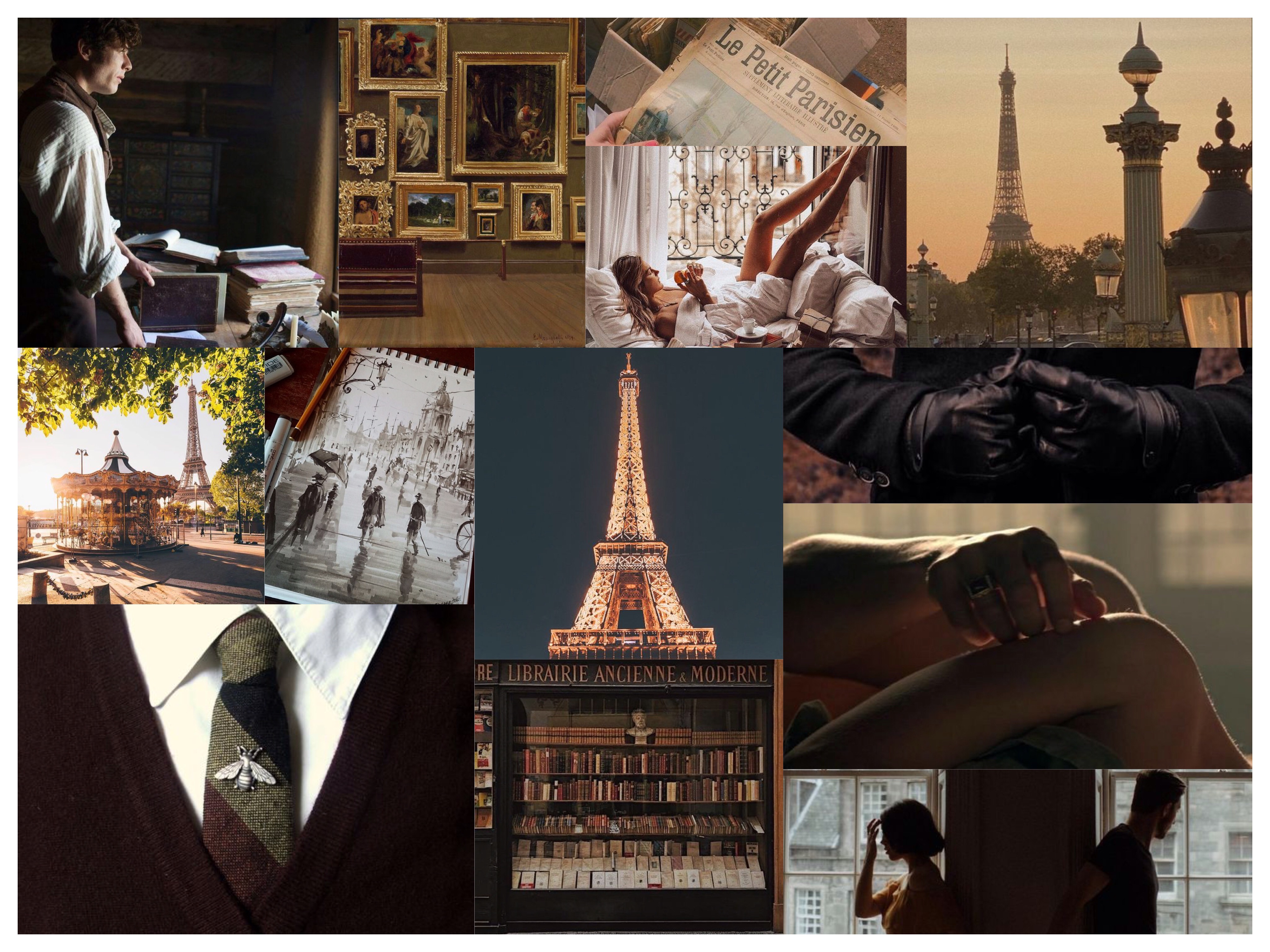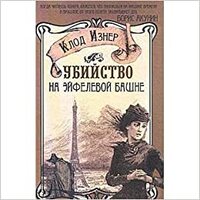Take a photo of a barcode or cover
It was barely okay. Read (or tried to) for book club. The most interesting thing about the book was the setting. Paris during the World's Fair- what a great place to visit in a book! Some of the little details, like the Golden Book which people signed to prove that they had ascended the brand-new Eiffel Tower, were things I hadn't known and those little details did a good job of bringing Paris to life.
Paris was by far the most engaging character in the book. The authors seemed to take a bit of smug distance to gently mock almost every character in the book, with the possible exception of Tasha. And to be fair, some of the characters needed mocking, most notably Victor, our hero, who for no apparent reason suspects both his business partner and his girlfriend-to-be as murder suspects, for no real reason than that he doesn't always know where they are, and that they signed the Golden Book of the Eiffel Tower around the time that a man was murdered (hence the book title) there. Sure, these people were there, but so were HUNDREDS of others. And it's not like Victor goes through any organized process of analyzing the Golden Book, or much else about the murders. He only notices clues that relate directly to him, which leaves out possible mountains of evidence. Also, he's really a jerk and a stalker to Tasha, and if it weren't for Plot Reasons, I don't know why she'd have anything to do with him.
The POV switches randomly from one character to another, the prose meanders about in the same fashion. So, without good plot or good characters, we're just left with the setting to enjoy, and that's just not enough.
Paris was by far the most engaging character in the book. The authors seemed to take a bit of smug distance to gently mock almost every character in the book, with the possible exception of Tasha. And to be fair, some of the characters needed mocking, most notably Victor, our hero, who for no apparent reason suspects both his business partner and his girlfriend-to-be as murder suspects, for no real reason than that he doesn't always know where they are, and that they signed the Golden Book of the Eiffel Tower around the time that a man was murdered (hence the book title) there. Sure, these people were there, but so were HUNDREDS of others. And it's not like Victor goes through any organized process of analyzing the Golden Book, or much else about the murders. He only notices clues that relate directly to him, which leaves out possible mountains of evidence. Also, he's really a jerk and a stalker to Tasha, and if it weren't for Plot Reasons, I don't know why she'd have anything to do with him.
The POV switches randomly from one character to another, the prose meanders about in the same fashion. So, without good plot or good characters, we're just left with the setting to enjoy, and that's just not enough.

Париж с высоты 324-х метров.
Книга больше похожа на путеводитель по всемирной выставке в Париже в 1889 году. Замечательно, не поспоришь, но детективная составляющая суетлива. Героев много, и что печально основные, включая и злодея, прописаны плохо, так что ты не понимаешь, кто кому друг, враг и кто сейчас куда побежал. Можно многое простить книге, но не тот момент, когда ты в героях разобраться не можешь, даже если их называют по имени.
Если убрать такую составляющую как детектив, то получится интереснейшее произведение на тему того, каким был Париж во время Всемирной выставки. Что было модно, как менялись вкусы, зачем выставку вообще устраивали, какая музыка звучала на улицах города и как жили простые парижане. Тут подружки-авторы молодцы, именно эта составляющая книги была шикарна! Город оживал, начинал звучать на разные голоса, проявлялись звуки города, пахло типографской краской. Ты не столько читаешь книгу, сколько гуляешь по Парижу, любуешься им и ужасаешься. Оживает и книжный магазин, но не за счет главных героев, владельцев магазинчика, а за счет второстепенных персонажей. Шикарные барышни, жаждущие своих книг, помощник при магазине, единственный, кто оставался на месте и справлялся с барышнями) Это было написано живо, может чуточку на читателя, но так весело, что именно эти кусочки и запоминались.
Мы должны были бы влюбиться в главного героя, переживать за его отношения с женщинами, но этого не было. Мало того, я только ближе к середине книги поняла, что именно наш герой имеет любовницу, с которой не в силах поговорить, поэтому расстается с ней можно сказать через смс, то есть, ничего ей не сообщая. Его новая... пассия, любовница, возлюбленная, тут не понятно кто, описана плохо. Второстепенная, уехавшая барышня опять же была ярче, ее было не больше страницы, а ты ее представил, живую, настоящую, лапушку с формами и желаниями, а главная героиня выглядит серым пятном. У нее есть вспышки, где она проявляется, но образ не складывается и не очаровывает. Она никакая, должна быть сильной и смелой, как в песне:
Красивая и смелая, дорогу перешла.А не вышло такой женщины. Не чувствуется ее самостоятельности, ее недовольства, ее влюбленности. Она есть, ты про нее читаешь, но тебе не за что ухватиться, не за что полюбить ее. Кажется, что и сам герой ее не так чтобы любит, его восхитил один момент с ней в книжном магазине и на этом продолжает держаться интерес, как и у читателя, потому что больше ничего его не восхищало, он больше ничего в ней не видел. Это печально, ведь это главные герои, ради которых ты должен взяться за следующую книгу в цикле.
И опять главная линия, детективная, прописана плохо, в отличие от второстепенной линии, которая должна задавать атмосферу - экскурсной. Детективная линия сумбурна, само расследование дергано, причина поступка настолько никакая, что ты разочаровываешься до беспамятства. Сам способ убийства вроде бы интересен, но не изящен, не похож на взмах фокусника, как действительно происходит в классических детективах. Все выглядит грубовато. В сериале "Смерть в раю" в одной из серий, кажется, девятого сезона, был момент с избирательными кабинками, где убийца чуть ли не на авось надеется и успевает убить человека и проделать кучу дополнительных действий, не издав ни звука, да еще и убежать, пока не глухой свидетель отворачивается и отходит к своему столу, ну в шагах пяти от места убийства. Когда на такое смотришь думаешь в себе ли были сценаристы, вот и тут читаешь рассказ убийцы об убийстве и задаешься вопросом, а в себе ли были писательницы? Мне порой кажется, наверное с книги "Изящное искусство смерти", что авторы сейчас слишком погружаются в мир кино и забывают о реальности, о том, как действуют и двигаются люди на самом деле. Не сложно написать сцену под картинку на экране, мы ее посмотрим с эффектами и что-то не заметим, не сможем оценить, да и картинка - это еще и психологический тон, сложно учитывать ее как реальность, но когда мы читаем, мы представляем движения во времени настоящем и чувствуем несоответствие, на которое и скажем - не верим. Вот тут у нас как раз читаешь и не веришь.
Как детектив книга больше разочаровывает, но как возможность попутешествовать по Парижу - это прелесть какая книга)
зы. Добавлю, что перевод у книги хороший. И не вина переводчика, что второстепенные линии у авторов лучше основных)
I suspect we all pick up a book looking forward to what is going to happen. So normally around page 50 a reader will be getting twitchy if nothing much has happened. Get to the end of the book and it still seems like you're waiting for something to happen and it's a very frustrating experience.
Set during the 1889 World Expo in Paris, the Eiffel Tower has just been officially opened and is a massive attraction. When a woman dies on one of the Tower's platforms, officially she died from a bee sting. As other people also die supposedly from bee stings, the police are not particularly interested, but Victor Legris, local bookseller and man about town type, is convinced that there is something sinister to these deaths.
Part of the reason that the book seems to go nowhere is that very early on the reader will find themselves being dragged down all sorts of cul-de-sacs, and dead-end alleyways into some, albeit fascinating historical aspects. What the book does particularly well is give you a great sense of the place and time - with some of those cul-de-sacs quite interesting in their own right. If only they hadn't dragged the focus away from the main plot point just once too often.
None of that meandering around was much helped by the investigation style of Legris. Which seemed to amount to a lot of leaping and posturing, and very little in the way of fact gathering - or disclosure to the reader for that matter.
The other problem with the book was some seriously poor character development, particularly that of Legris and his love interest, Tasha the Russian artist. He was very flat, and strangely one-dimensional and I did wonder how much the background of the author (actually two Parisian bookselling sisters) informed their view of their central protagonist. Perhaps they were aiming for dramatic and interesting, but alas ended up with melodramatic and a bit silly. Tasha didn't fare much better, as if being an artist in 1880's Paris wasn't enough of a cliché, she was Russian, she started out with a bit of potential, but quickly faded to bland.
I will dip into the next book in the series, as it's here, and first books are often not a good indicator of the potential of a series, but to be honest, I had to bribe myself with a chocolate for every 20 pages read to finish this one. I hope my doctor's not going to get all over-excited about my blood sugar levels after the next one.
Set during the 1889 World Expo in Paris, the Eiffel Tower has just been officially opened and is a massive attraction. When a woman dies on one of the Tower's platforms, officially she died from a bee sting. As other people also die supposedly from bee stings, the police are not particularly interested, but Victor Legris, local bookseller and man about town type, is convinced that there is something sinister to these deaths.
Part of the reason that the book seems to go nowhere is that very early on the reader will find themselves being dragged down all sorts of cul-de-sacs, and dead-end alleyways into some, albeit fascinating historical aspects. What the book does particularly well is give you a great sense of the place and time - with some of those cul-de-sacs quite interesting in their own right. If only they hadn't dragged the focus away from the main plot point just once too often.
None of that meandering around was much helped by the investigation style of Legris. Which seemed to amount to a lot of leaping and posturing, and very little in the way of fact gathering - or disclosure to the reader for that matter.
The other problem with the book was some seriously poor character development, particularly that of Legris and his love interest, Tasha the Russian artist. He was very flat, and strangely one-dimensional and I did wonder how much the background of the author (actually two Parisian bookselling sisters) informed their view of their central protagonist. Perhaps they were aiming for dramatic and interesting, but alas ended up with melodramatic and a bit silly. Tasha didn't fare much better, as if being an artist in 1880's Paris wasn't enough of a cliché, she was Russian, she started out with a bit of potential, but quickly faded to bland.
I will dip into the next book in the series, as it's here, and first books are often not a good indicator of the potential of a series, but to be honest, I had to bribe myself with a chocolate for every 20 pages read to finish this one. I hope my doctor's not going to get all over-excited about my blood sugar levels after the next one.
dark
informative
mysterious
tense
medium-paced
Plot or Character Driven:
Plot
Strong character development:
Complicated
Loveable characters:
No
Diverse cast of characters:
Yes
Flaws of characters a main focus:
No
i found this book to be sadly disappointing. part of the problem is that the translation from the original French is choppy and difficult in many places. i could imagine the phrasing in French and guess how it would have flowed better in the original. seems like the translator was a bit too faithful to the source material, without regard to the sound and feeling of the resulting English words. i enjoyed the concept of the story more than the work itself. set during the Paris World Expo in 1889 which saw the opening of the Eiffel Tower, the story unfolds as a group of seemingly unrelated people start to drop dead suspiciously. a bookseller with ties to some of the victims gets involved and solves the crime. the descriptions of the era were great, as i had hoped, but the plotting was less interesting. not recommended unless you really like to read about Paris.
I read this first in series as part of a book club. I had read number 6 already and was glad to go back to the beginning with this one. Unfortunately neither book did much for me.
While the mystery was good and fairly absorbing, I didn’t really care for the characters, and the writing didn’t flow smoothly, with some abrupt changes in place/narrative (which could have been due to translation issues).
In the end, it was just a so-so read for me.
While the mystery was good and fairly absorbing, I didn’t really care for the characters, and the writing didn’t flow smoothly, with some abrupt changes in place/narrative (which could have been due to translation issues).
In the end, it was just a so-so read for me.
Glad to see that I wasn't the only one wondering if something (everything) was lost in translation. I couldn't finish this, and I'm glad not to Waste my time trying to do so.
It's 1889 at the World Exposition and the Eiffel Tower is being debuted for the first time. Despite the beauty and magnitude of the structure, people can't help but notice the newspaper articles talking about several mysterious deaths- by bee sting.
While this sounds like an interesting enough storyline, I really had a hard time getting though this book and found the end to be pretty unsatisfying. I won't be rushing to pick up the second novel anytime soon.
While this sounds like an interesting enough storyline, I really had a hard time getting though this book and found the end to be pretty unsatisfying. I won't be rushing to pick up the second novel anytime soon.
I really wanted to like this. It was an interesting idea, were the victims murdered or did they die from bee stings. However none of the victims were given any time to develop so I didn't know them and didn't care about how they died and if they were murdered why, the characters that were given time to develop are unlikeable and I didn't care if they became victims or were the murderer.
The best thing I can say about this book is that it is one more off the to be read pile.
The best thing I can say about this book is that it is one more off the to be read pile.





